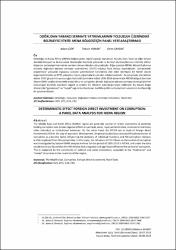| dc.contributor.author | Gök, Adem | |
| dc.contributor.author | Yamak, Tahsin | |
| dc.contributor.author | Saygın, Emre | |
| dc.date.accessioned | 2021-12-12T16:49:08Z | |
| dc.date.available | 2021-12-12T16:49:08Z | |
| dc.date.issued | 2018 | |
| dc.identifier.issn | 1307-9832 | |
| dc.identifier.issn | 1307-9859 | |
| dc.identifier.uri | https://doi.org/10.18092/ulikidince.445887 | |
| dc.identifier.uri | https://app.trdizin.gov.tr/makale/TXpJek1qa3pNdz09 | |
| dc.identifier.uri | https://hdl.handle.net/20.500.11857/1771 | |
| dc.description.abstract | Ortadoğu ve Kuzey Afrika (MENA) bölgesi genel olarak siyasal, toplumsal, hukuki, idari, ticari ve diğer birçokalandaki bireysel ya da kurumsal davranışlar üzerinde yolsuzluk ve benzeri olumsuz/bozucu nitelikte etkilerdoğurma potansiyeli barındıran rantiyer ekonomilerden oluşmaktadır. Diğer yandan MENA, iktisadi kalkınmayolunda doğrudan yabancı sermaye yatırımlarına (DYSY) oldukça fazla ihtiyaç duymaktadır. Literatürdekiaraştırmalar yolsuzluk olgusunu yabancı yatırımcıların kararlarına etki eden belirleyici bir faktör olarakdeğerlendirmekte ve DYSY-yolsuzluk ilişkisi çoğunlukla bu yönden irdelenmektedir. Bu çalışmada, literatürünaksine DYSY girişlerinin yolsuzluğun kontrolü üzerindeki etkisi 1996-2016 dönemi için MENA bölgesi özelindeSistem GMM analizi yöntemiyle araştırılmış ve veri şartlar altında doğrudan yabancı sermaye akımı girişlerininyolsuzluğun kontrolü üzerinde negatif ve anlamlı bir etkisinin bulunduğu tespit edilmiştir. Bu durum bölgeülkelerinde “geleneksel” ve “kapalı” yapılardan beslenen özellikle politik ve toplumsal kurumların kısıtlayıcılığıile açıklanmaktadır. | en_US |
| dc.description.abstract | The Middle East and North Africa (MENA) region are generally consist of rentier economies of potential holding corruption and similar negative effects on political, social, legal, administrative, commercial and many other individual or institutional behaviors. On the other hand, the MENA are in need of foreign direct investments (FDI) in the way of economic development. Empirical studies have assessed the phenomenon of corruption as a decisive factor influencing the decisions of individual investors, and FDI-corruption relations is often explored from this perspective. In this study, the influence of FDI inflows on the control of corruption was investigated by System GMM analysis method for the period of 1996-2016 in MENA, and under the data conditions it was found that the FDI inflows had a negative and significant effect on the control of corruption. This is explained by the constraints of political and social institutions, especially in the "traditional" and "closed" structures in the countries of the region | en_US |
| dc.language.iso | tur | en_US |
| dc.relation.ispartof | Uluslararası İktisadi ve İdari İncelemeler Dergisi | en_US |
| dc.identifier.doi | 10.18092/ulikidince.445887 | |
| dc.rights | info:eu-repo/semantics/openAccess | en_US |
| dc.subject | İktisat | en_US |
| dc.subject | İşletme | en_US |
| dc.title | DOĞRUDAN YABANCI SERMAYE YATIRIMLARININ YOLSUZLUK ÜZERİNDEKİ BELİRLEYİCİ ETKİSİ: MENA BÖLGESİ İÇİN PANEL VERİ ARAŞTIRMASI | en_US |
| dc.title.alternative | DETERMINISTIC EFFECT FOREIGN DIRECT INVESTMENT ON CORRUPTION: A PANEL DATA ANALYSIS FOR MENA REGION | en_US |
| dc.type | article | |
| dc.department | Fakülteler, İktisadi ve İdari Bilimler Fakültesi, İktisat Bölümü | |
| dc.identifier.volume | 0 | en_US |
| dc.identifier.startpage | 287 | en_US |
| dc.identifier.issue | Prof. Dr. Harun TERZİ Özel Sayısı | en_US |
| dc.identifier.endpage | 302 | en_US |
| dc.relation.publicationcategory | Makale - Ulusal Hakemli Dergi - Kurum Öğretim Elemanı | en_US |



















